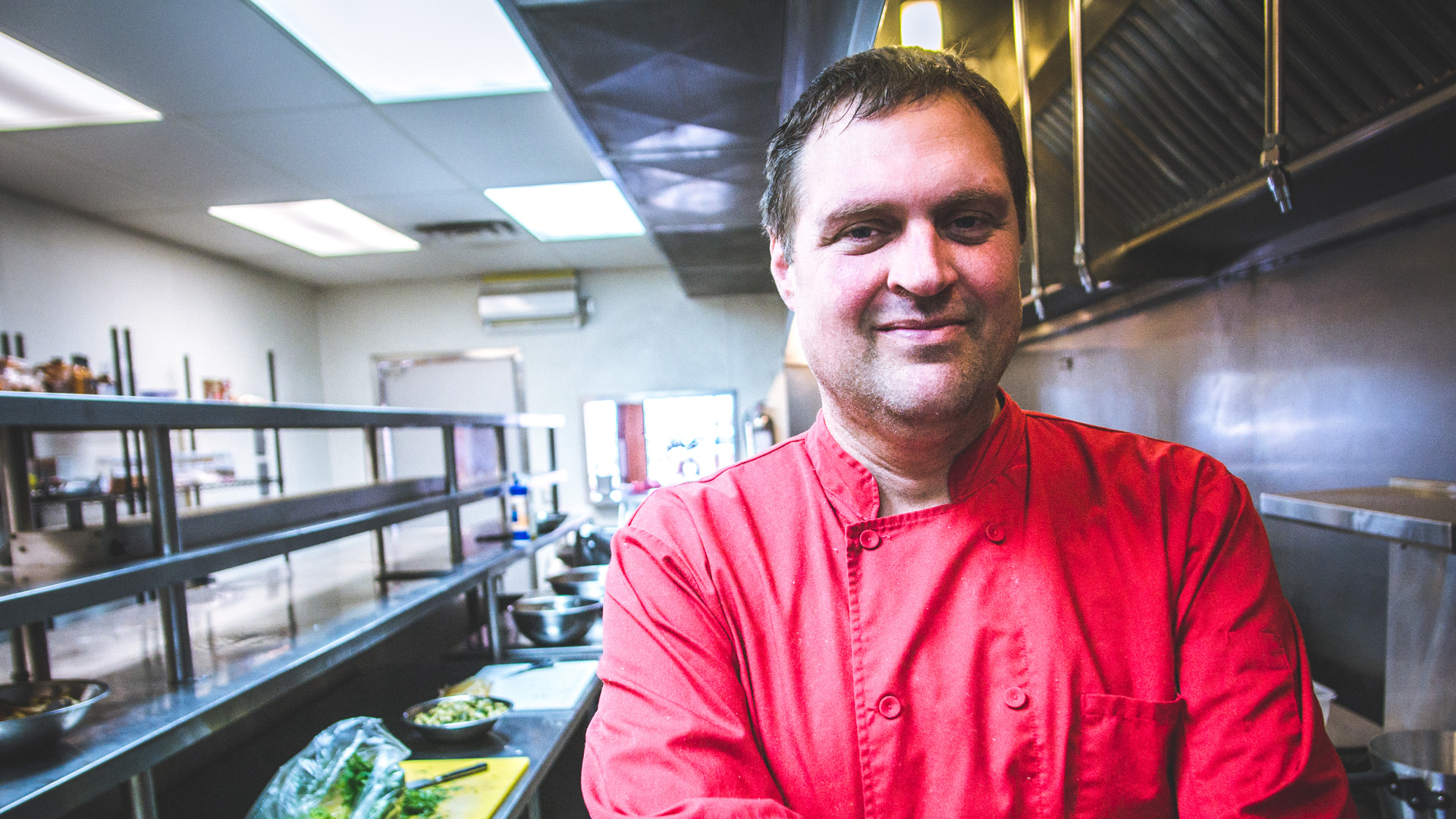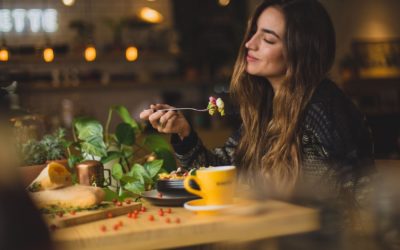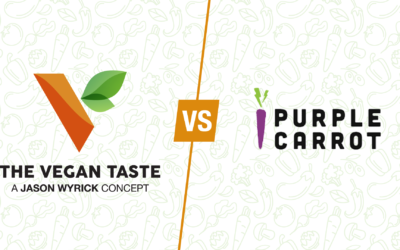The following interview originally appeared on the Delt Dental members blog.
For many Americans living with diabetes, connecting the dots between diet and overall health becomes a routine part of their everyday lives. Diabetes affects a person’s weight, blood sugar, and even oral health. What you eat each day affects every part of your body, from your eyes to your mouth. But deciding to make dietary changes, like reducing sugar or switching to a vegan diet, can take time. For Valley chef Jason Wyrick, a diabetic diagnosis was a lightbulb moment.
In 2001, he was suffering from the hallmark symptoms of diabetes but he refused to believe it. “I was diagnosed with diabetes and it was really traumatic because I knew I had it, but I was in complete denial about it. I had failing eyesight. My joints hurt. My thinking was cloudy. I had all the symptoms but didn’t want to admit it,” he said.
After winding up in the emergency room with an infection, the ER doctor dropped the health bomb that left Jason reeling. “He came back in the room yelling at me, saying ‘Why didn’t you tell me you were diabetic?’ He basically said, ‘This is so bad, you’ll need to be on medication for the rest of your life.’ And I thought, ‘Hell no!’”
That’s when he decided to switch to a vegan diet. We talked with Jason about his decision to make his health a priority and his rise to notoriety in the vegan culinary community in our latest installment of Food for Thought.
JA: First off, how did that switch to a vegan diet improve your overall diabetes symptoms?
JW: My symptoms were completely gone in 3 months, including my eyesight reverting to 20/15 vision.
JA: You saw results quickly, which is wonderful. What other changes did you notice to your overall health? And are there any drawbacks to the vegan diet?
JW: The research is clear. The more plants you eat, the better your health outcomes. This is from a statistics point of view. There will always be outliers. We all know that smoking is bad for you, but there are people like my grandfather who smoked several packs a day and lived until he was in his mid- 80s. Specifically, what I saw with myself is my energy improved, my skin stayed healthy and I’ve barely started to get gray hair and I’m 47 years old. I’ve helped people reverse heart disease, diabetes, and obesity by showing them how to eat a healthy, plant-based diet. The big drawback I see is that it’s easier than ever to go vegan now, but it’s hard to stay on a healthy path because there are so many vegan junk food options available. You still need to eat a primarily whole foods plant-based diet.
JA: Thank you for opening up to us about your struggles with diabetes and your switch to a plant-based diet. Could you tell us a little bit about how you found your way into cooking as a career?
JW: I started to learn how to cook when I was about to graduate college and I went to eat at this Egyptian restaurant, and it was the best food I’ve ever had. And I just thought, “Oh my God, how can I eat like this from now on?” So I taught myself to cook because of that, and I just wound up having a talent for it and I just kept going with it. But I never thought I’d do it professionally. I thought I would just do it for fun.
JA: It’s amazing when a career path sort of opens before your eyes. How did vegan cooking make its way into your skillset?
JW: I had gone vegetarian 5 years earlier but was dumb about it. I just replaced meat with cheese. But when I went vegan, it was completely different. It was a completely new thing for me. After my emergency room visit, I made a dietary change. I cut out all of the animal products I was eating. One week later, I felt pretty good. But three weeks later I began to crave fresh fruit and things that are good for you. This all coincided with me being dissatisfied with the job I had. I was the director of marketing for a technology company and I wanted to make a change there too. I was like, this is it. I can heal people through food and do something meaningful with my life. I’m not on any medication now and my blood sugar is good.
JA: This trajectory into vegan cooking gave you the chance to be the first vegan chef to teach at Le Cordon Bleu at the Scottsdale Culinary Institute. How did that happen and what was it like to not only be the first but to know that you were teaching a brand-new way of cooking to a whole new group of young chefs?
JW: It was funny; I got that job because I was doing a television segment and the head chef at the school was on right after me. He invited me to come and teach for the summer, so I said sure. Scottsdale Culinary Institute was teaching classical French cuisine, which is basically fat flavored with fat. And I was coming not only from a vegan perspective but also a healthy standpoint. So it was a culture shock for the students. This was in 2008 when veganism was just becoming mainstream.
About a third of the students came up to me and told me they wanted to learn about vegan cooking, but they’d only come up in groups of one or two students. They didn’t want people to know they were interested in vegan food. Teaching in a culinary school was a culture shock for me too because I basically taught myself a lot of the professional stuff.
JA: You recently launched your own restaurant, Casa Terra. How exciting! Tell us about this new venture and the “plant-forward” menu.
JW: We opened in February of 2019. And it’s the first and only high-end vegan restaurant in the state. I love authentic Mexican food and I love different parts of the Mediterranean. I fell in love with Italy. I love Moroccan food. And I thought, “I’m just going to serve the food that I like,” so the menu wound up being a fusion. And the menu changes pretty frequently. I would get bored out of my mind if I served the same thing night after night.
We have some struggles right now because we’re off a side street, so we’re not very visible (this interview was conducted at the height of the COVID-19 pandemic and the restaurant is temporarily closed). So, people usually must know about us to come in. Usually a vegan or vegetarian will bring a non-vegan friend in. And when they eat the food, they’re like ‘this is incredible’ and they usually come back.
JA: What’s the reception been like? Are you noticing a shift in the way people are dining these days?
JW: People are more accepting now, I think. I think 10 years ago, vegan was a bad word. And now people are way more accepting. You’ll say, “Hey I’m vegan,” and they’re like, “That’s cool!” Ten years ago, they would look at you sideways.
JA: The firsts just keep rolling in, but how did you decide to develop the first vegan magazine, The Vegan Culinary Experience?
JW: I started the magazine in 2006. The previous year I had started a newsletter and it got popular, so I turned it into a digital magazine. I had a stable of writers which was nice, but I did a lot on my own. I did the graphic design; I wrote most of the content. I had about 40,000 readers. I folded it in 2013 because it was just taking too much time. But because of that magazine, I started the food delivery service.
JA: What a perfect segue! Tell us about launching your own delivery service, The Vegan Taste.
JW: I was making all this food and taking pics and tasting recipes for the newsletter and the magazine. I ended up with a lot of food leftover every week. So my friend was like, “Hey, can you get me weekly meals,” and I thought, ‘” Ding!” So people would get the magazine and then get the food. But the delivery service itself completely took over after a couple of years. We originally treated the delivery service like a side hobby and it just took off.
JA: What’s your favorite mouth-healthy ingredient to cook with when the weather heats up?
JW: Mushrooms and chilis. Those are my two favorite ingredients. I love spicy foods.
JA: Who do you admire? Who keeps you on your toes in your industry?
JW: Usually if I need some inspiration or want to see somebody doing something that I really love to do, I’ll watch Rick Bayless. I love the story, the science, the anthropology behind the food. How a meal came together, where it came from. When you can learn to make authentic food, it’s a way to experience something special. You’re experiencing culture at that point.
JA: What brings you the most joy when you’re at work? What puts a smile on your face?
JW: I think it’s creating something that makes another person go, “Wow, this is incredible,” and puts a smile on their face. When you see somebody’s face light up and they have a sense of wonder, excitement, laughter, and joy on their face. And they’re trying something you’ve never made before, that’s really exciting.
JA: Do you have advice for somebody who is wondering if a vegan or plant-based diet could be right for them?
JW: It’s not a diet that requires this highly technical, finely tuned way of eating to succeed, certainly no more so than any other way of eating. Just eat lots of greens, legumes, and veggies and you’re on the right track. Make sure it’s tasty or chances are you’ll quit. Psychology is just as important as physiology.
JA: For home cooks who want to create something special, or maybe for people who don’t feel confident in the kitchen, what’s something they can do to make some magic happen?
JW: I think the thing I really like to instill in people is they must pay attention to the timing of when ingredients go into the pan. A lot of home cooks throw everything in at the same time. It crowds the pan. But your carrots will be done at a different time than your onions, so pay attention to when things cook and how long they take to cook. And adjust when you add more to the pan and it will make a huge difference in the food. The other thing I strongly suggest for home cooks is if you’re eyeballing something and you’re not sure if it’s enough, it’s not enough.




